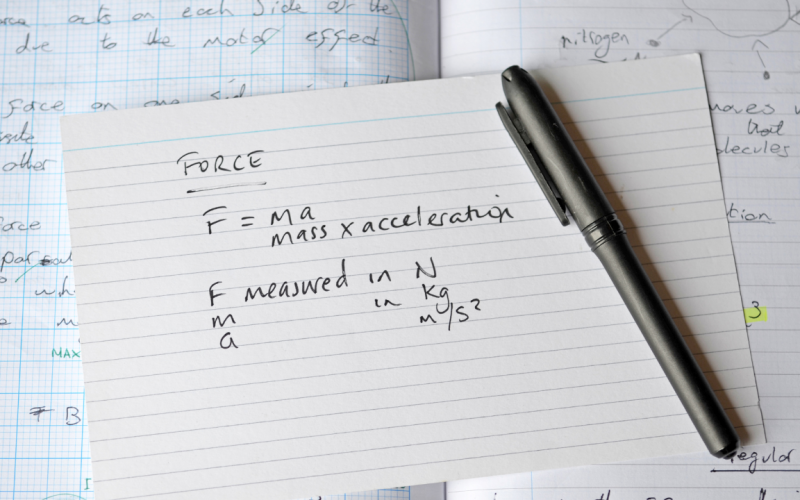GCSEs – how many do you actually need to take? GCSE’s are like the stepping stones on your academic journey. These exams serve as a crucial stepping stone for students, shaping their academic and career paths.
They equip you with the knowledge of different subjects, that prepares you for the next step in your academic career. But how many stepping stones are there exactly?
In this article, we will talk the number of GCSEs students can take and why.
Table of contents
Understanding GCSEs
Before getting into how many GCSEs students take in 2024, let’s start with a brief overview of what GCSEs are and their significance. GCSEs are a set of exams taken by students in England, Wales, and Northern Ireland. These exams typically occur at the end of Year 11, marking the completion of compulsory education.
The Core Subjects
Traditionally, students are required to take certain core subjects, which include:
- English Language
- Mathematics
- Science (often divided into Biology, Chemistry, and Physics)
- These core subjects provide a strong foundation of literacy, numeracy, and scientific knowledge.
Optional Subjects
In addition to the core subjects, students can choose optional subjects based on their interests, career aspirations, and the curriculum offered by their school. The number of optional subjects a student can take may vary from one school to another.
Read Also: When Do You Do Your GCSEs? Everything You Need to Know
How Many GCSEs Do Students Take?
The number of GCSEs students take can vary significantly based on several factors, including the school’s policies, individual preferences, and career goals. On average, students take between 8 to 10 GCSEs. This includes the core subjects and a selection of optional subjects.
Factors Influencing the Number of GCSEs
Here are some of the factors that affect the number of GCSEs you can take:
1. School Policies
Schools may have specific policies regarding the number of GCSEs students are encouraged or required to take. Some schools may emphasize a broader curriculum, while others focus on specialization.
2. Student Aspirations
Individual student aspirations are pivotal in determining the number of GCSEs they take. Students interested in a particular subject or career path may take additional GCSEs related to that field.
3. Career Goals
For students with well-defined career goals, the number of GCSEs they take may align with the prerequisites of their chosen career. Certain professions may require specific GCSE qualifications, such as languages for translation careers or additional sciences for medical pathways.
4. Academic Ability
Students’ academic ability and confidence in various subjects can influence their GCSE choices. Some students may opt for fewer GCSEs to focus on excelling in their chosen subjects, while others may prefer a broader range.
Read Also: What is the American Equivalent for G.C.S.E and A level?
The Implications of GCSE Choices
The GCSEs a student chooses can have far-reaching implications for their future educational and career prospects. It’s essential to consider these implications when making decisions.
University Admission
Many universities and colleges consider GCSE results when assessing applications. Certain courses may have specific GCSE requirements, making it crucial for students to meet these standards.
Career Opportunities
The GCSEs a student holds can affect their eligibility for various career opportunities. Some employers may prioritize candidates with specific GCSE qualifications relevant to the job.
Personal Growth
GCSEs allow students to explore different subjects and develop a broad skill set. The subjects chosen can contribute to personal growth and a well-rounded education.
Also, see: How Many GCSEs is English Worth?
How Many GCSEs Do You Take?
If you’re studying for a GCSE in the UK, you must pass five or six subjects at grade C or above. The following grades are equivalent:
- A* (1) – 0.5% of entries
- A (2) – 2% of entries
- B (3) – 5% of entries
If you are taking four or more GCSEs, a ‘C’ grade would not qualify as an acceptable result for any subject; however, if your overall average is higher than this threshold, then it may still be possible to receive an ‘A’ grade on some elements.
But that will not be enough others so that they could then be used together with other information such as predicted grades and predicted exam results provided by schools before final decisions are made regarding whether candidates have passed certain courses successfully before being awarded certificates which may lead towards employment opportunities later down life’s road when needed most!
Also, read: Do G.C.S.E Qualifications Expire? Your Questions Answered
Ways to Get Their GCSE
You can get your GCSEs through school or by studying at home in two main ways.
- School: This is the easiest way to get your GCSEs. You’ll need a teacher, a set of books, and other supplies like pens and paper. Most schools offer flexibility with their timetables so that you can fit in with family commitments (and maybe even make more money). It’s best if the school is close to your home because it won’t take long to get used to studying there.
- Home Study: Some students choose this option because they don’t want to move away from home yet but still want more than just passing grades on their A-Levels/GCSEs, which can only be achieved at school!
The downside here is that most universities require applicants with certain qualifications, such as A Levels/GCSEs, before considering them for entry into university courses leading up to studying at the university level itself (e-learning, etc.).
If you’re in school, you’ll need to pass a minimum of two GCSEs at grade C or above and one at grade A* (or equivalent).
If your first GCSE results are below the expected standard, there are 2 options:
- Take 1 or 2 extra exams to raise your grades. This is known as a ‘top-up’ study and can be done online or through an external agency that specializes in helping students retake their exams. You’ll need to pay for this yourself – but it’s worth checking out because it might save time and money!
Also, if you’re studying at home, it’s possible to do this without leaving secondary school.
If you’re studying at home and want to get qualifications from your local authority (LA), then this is possible too.
Read Also: How Do I Get my GCSE Results?
Also, read: Why Many Fail GCSE Exams
How Do Students Get GCSE Qualifications?
To gain qualifications, students work towards obtaining their General Certificate of Education (GCE) or Advanced Level qualification. The GCE is a level 3 qualification that allows students to move on to higher education in the UK.
Students can also take exams outside of school, such as the Cambridge Pre-U examination, which tests knowledge on topics such as science, maths, and English language skills.
Available qualifications include A-Levels, International Baccalaureate (IB), Scottish Highers, BTEC National Extended Diplomas (ND), and Cambridge Nationals.
The most popular A-levels are:
- Mathematics – the most popular subject in the UK by far.
- Further Mathematics – a specialized version of maths aimed at very high-ability students who want to study for degree-level mathematics or physics.
- Physics – an option for students with strong academic results and some practical experience in science/technology subjects (e.g., biology).
About Diploma in Gcse
The Diploma is the most popular academic qualification for vocational courses and is awarded upon completion of an appropriate number of lower-tier vocational courses such as A-Levels, BTEC National Extended Diplomas (ND), and Cambridge Nationals.
The Diploma was developed by the General Certificate of Education (GCE) Board to provide a more comprehensive qualification than GCSEs, at least locally recognized by employers.
This was achieved by including three strands: General Studies; Technical subjects, and Business Studies or Humanities subjects (or languages). All students have to complete one subject which forms part of their overall education program so that they can progress onto a higher level of study or employment later on if they wish.
Tips for Preparing for GCSE Success
Preparing for GCSEs can be a challenging yet rewarding experience. These exams are significant in your academic journey and can impact your future. To help you achieve GCSE success, here are some valuable tips:
1. Start Early
Begin your preparation well in advance. Cramming at the last minute can lead to stress and hinder your performance. Create a study schedule that allows you to cover all subjects systematically.
2. Understand the Exam Format
Familiarize yourself with the format of each GCSE exam you will be taking. Understand the types of questions, time limits, and marking schemes. Past papers and official exam guidelines are excellent resources.
3. Organize Your Study Material
Keep your study materials well-organized. Ensure you have access to each subject’s textbooks, notes, and resources. Organized study spaces can boost productivity.
4. Set Clear Goals
Define your academic goals. Understand the grades you need to achieve for your desired courses or career paths. Having clear objectives will motivate you to work diligently.
5. Prioritize Subjects
Not all subjects require the same amount of time and effort. Identify your strengths and weaknesses and allocate more study time to challenging subjects while maintaining a balance.
6. Effective Study Techniques
Experiment with various study techniques to find what works best for you. Some popular methods include flashcards, mind maps, and group study sessions.
7. Seek Help When Needed
Don’t hesitate to ask for help if you’re struggling with a particular subject. Teachers, tutors, and peers can provide valuable assistance and clarify doubts.
8. Practice Regularly
Practice is key to success. Solve practice papers and questions regularly to improve your understanding and time management skills.
9. Stay Healthy
Good physical and mental health is essential for effective studying. Get enough sleep, eat well, and take short breaks during study sessions to recharge.
Read Also: Are GCSEs (Actually) Hard? Top Tips for Passing the Most Difficult GCSE Exam Papers
FAQs
Yes, some students may choose to take more than 10 GCSEs, depending on their school’s policies and their preferences.
No, schools have some flexibility in the GCSE subjects they offer. The availability of subjects may vary from one school to another.
While the core structure of GCSEs is similar, these regions may have variations in curriculum and assessment methods.
Yes, students can retake GCSE exams to improve their grades if they wish.
When choosing GCSE subjects, it’s essential to consider your interests, career goals, and the prerequisites of your desired educational and career paths. Seek guidance from teachers and career counselors to make informed choices.
Conclusion
The number of GCSEs students take largely depends on their chosen subjects and educational institutions. With the introduction of new courses and changes to the curriculum, students may have a wider range of options available to them.
However, it is important for students and educators to carefully consider the implications of taking on too many subjects, as it can increase stress levels and decrease performance. To make informed decisions, students should seek guidance from their teachers and career advisors, who can provide valuable insights into the best course of action for their future goals.
References
- Gov.uk/government – How many G.C.S.Es to take – results
- Edumentors.co.uk – taking G.C.S.E – everything you need to know
Recommendations
- When Do You Do Your G.C.S.Es? Everything You Need to Know
- How to Sit For GCSE Exams Privately: The Extensive Guide
- What Happens If You Fail Your G.C.S.Es Twice?
- Do You Have to Pass Science G.C.S.Es to Get a Job?
- Minimum Age to Take GCSE: Can You Take Your GCSEs Early?
- What is the American Equivalent for GCSE and A level?
- Why Many Fail GCSE Exams
- Are GCSEs (Actually) Hard? Top Tips for Passing the Most Difficult GCSE Exam Papers






